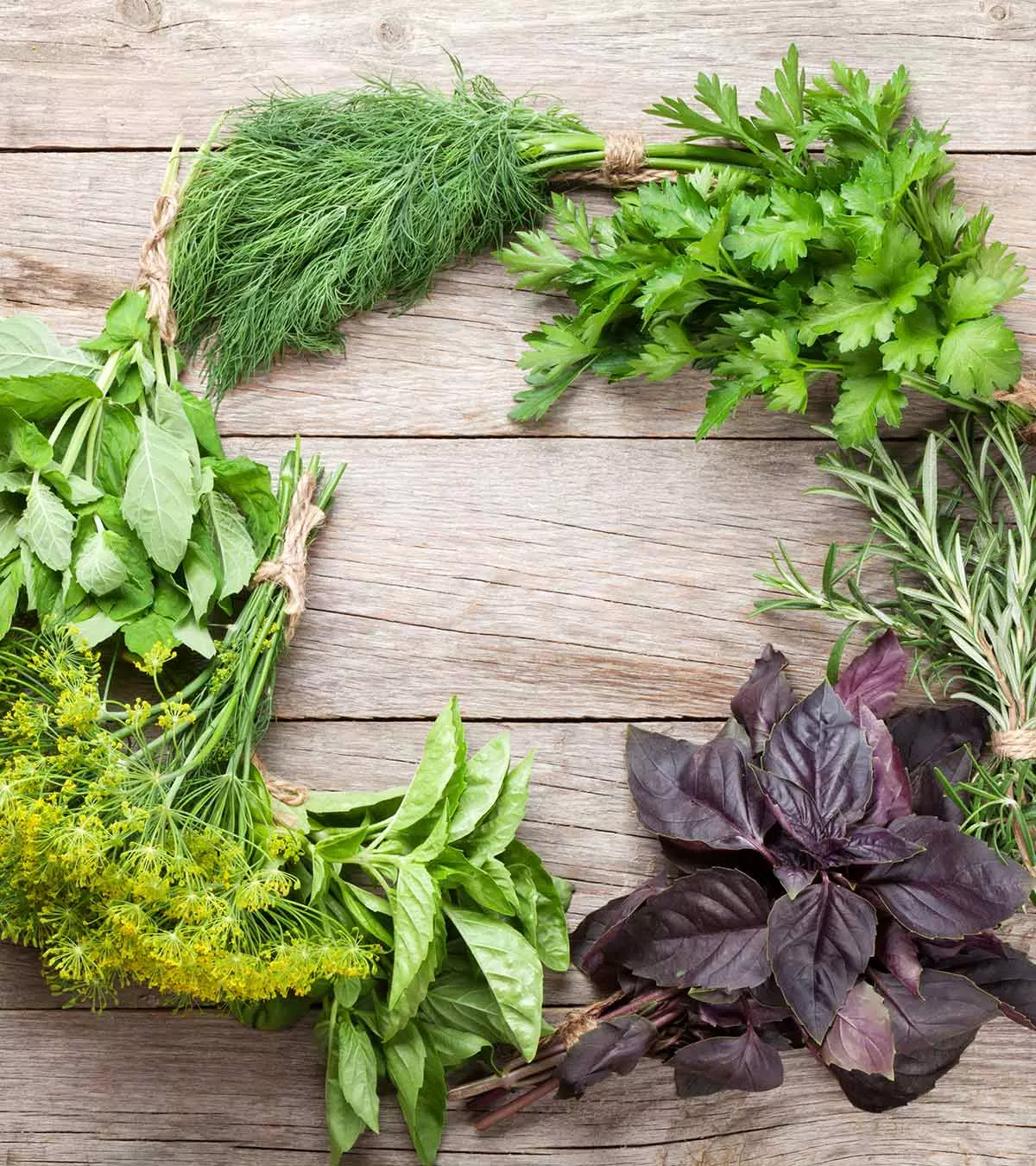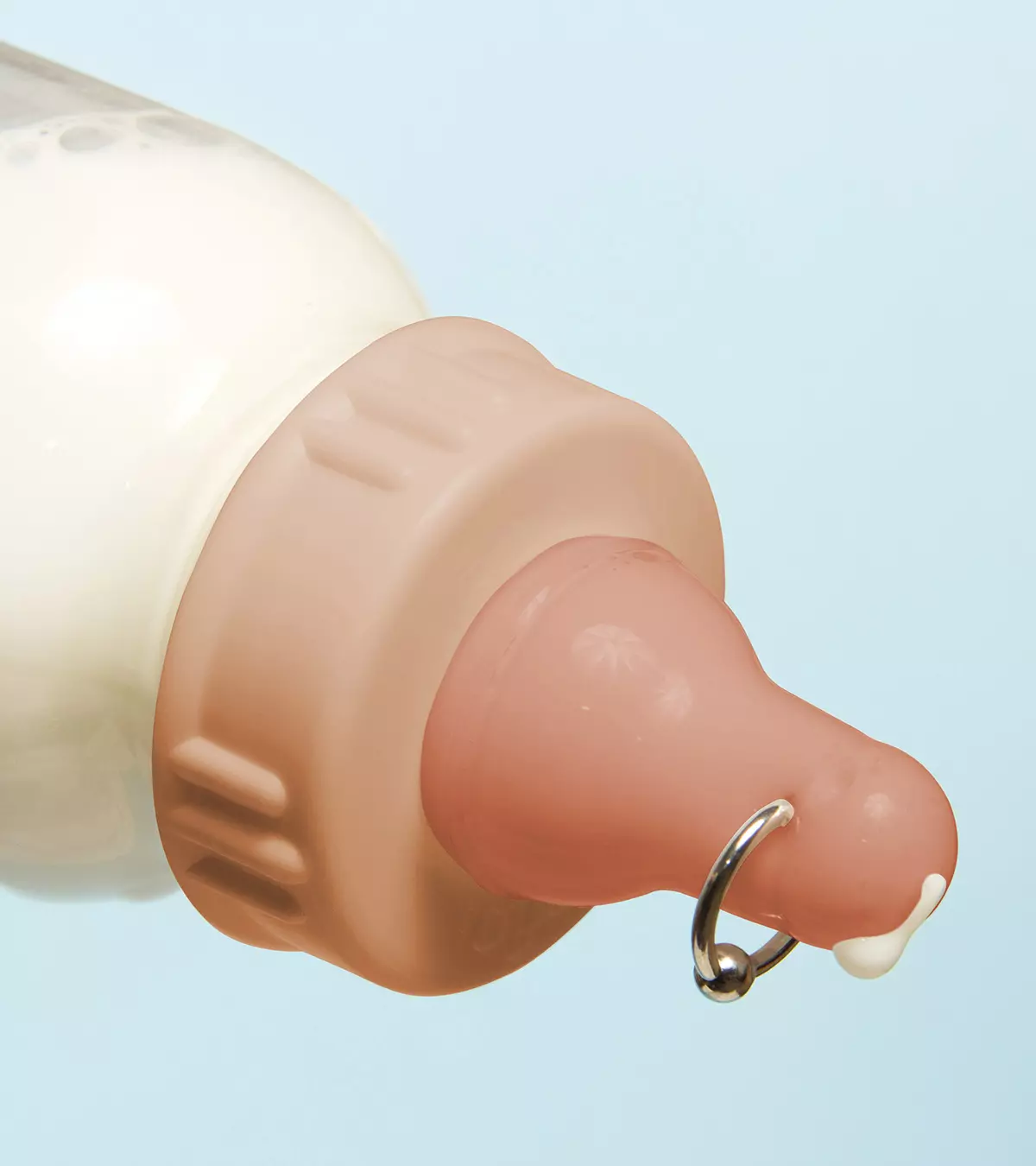
Image: Shutterstock
While breastfeeding, women are often advised to eat plenty of fruits to maintain a nutritious diet. However, not all fruits are beneficial for lactating women. Thus, some fruits to avoid while breastfeeding are citrus fruits, cherries, and prunes. Although they may not cause direct harm to the mother, they can induce undesirable reactions in the baby.
Scroll through this article to learn more about the effects of these fruits on babies during lactation and why they should be avoided. This post also offers some safer alternatives to these fruits so that you don’t miss out on the essential nutrients they provide.
Key Pointers
- To prevent adverse reactions in the baby while breastfeeding, it’s recommended to avoid consuming citrus fruits, cherries, and prunes.
- Citrus fruits have been associated with digestive problems, fussy behavior, vomiting, and diaper rash in breastfed babies.
- Cherries and prunes can also cause gas in babies, so it’s advisable to stay away from these fruits as well.
- Safe alternatives to citrus fruits, cherries, and prunes are mango and papaya, which provide vitamin C without negative effects on the baby.
Fruits To Avoid While Breastfeeding
California-based lactation consultant and postpartum doula Laura Howells says, “Avoid fruits that you know can trigger a reaction. If you’re at high risk for gut dysbiosis or yeast infections, it may help to limit high-sugar fruits and focus on lower-sugar options like berries and kiwis.”
When you are breastfeeding, you aren’t as rigid about your diet as you were during pregnancy. However, a proper and a healthy maternal diet is highly desirable as it has a direct effect on your breast milk. Many a time, there is a possibility that your infant may fall ill, develop sensitivities, or contract allergies due to your improper diet. Infections and microbes remain in your breast milk and pass into your infant’s body. While your postpartum diet is all about making sufficient quality and quantity of milk, you should follow some dietary restrictions. There are also some types of foods to avoid while breastfeeding to ensure your and your baby’s safety.
Experts suggest breastfeeding mothers include at least five portions of fruits and vegetables daily to ensure they receive all the essential nutrients (1). Fruits provide extra nourishment to your baby through your milk. However, not all fruits have similar advantages, especially when you are breastfeeding. Remember that your baby’s health will directly depend on your diet. It’s important to remember that every baby reacts differently. Some babies may tolerate these fruits well, while others might be sensitive to them. Watching how your baby responds when you introduce new foods into your diet is a good idea. Keeping a food diary can help you track any foods that may upset your baby.
Here we list some fruits to avoid while breastfeeding for you and your little one’s well-being.
1. Citrus fruits

Juicy, tangy and incredibly tasty is how you would describe most citrus fruits. Citrus fruits are some of the most popular fruits, and they form a major part of your fruit basket. However, as a lactating mom, you need to monitor your intake to see if citrus fruits are affecting the baby’s digestion through your breast milk.
Dr. Nicole Avena, researcher and expert in nutrition and diet, says, “A mom’s diet can significantly impact her breastfeeding baby, and some fruits may cause digestive upset. Citrus fruits like lemon, lime, and orange have been specifically linked to reactions in some babies.”
A study involving mothers with nursing experience and medical professionals examined their views and knowledge regarding diet during lactation and the appropriateness of different foods. The findings revealed that 93.97% of participants believed lactating mothers should avoid consuming citrus fruits (2).
Citrus fruits include lime, kiwi, strawberries, pineapples, oranges, and grapes. Often, citrus fruits lend a pungent flavor to your breast milk. Studies show that flavors from the maternal diet can transfer to breast milk, potentially influencing an infant’s acceptance of these flavors later in life (3). Some babies might object to the taste of it, and get fussy while consuming it. Other babies may vomit. Sometimes, your baby may also develop diaper rash as a result of the citrus content in breast milk (4).
2. Cherries and prunes
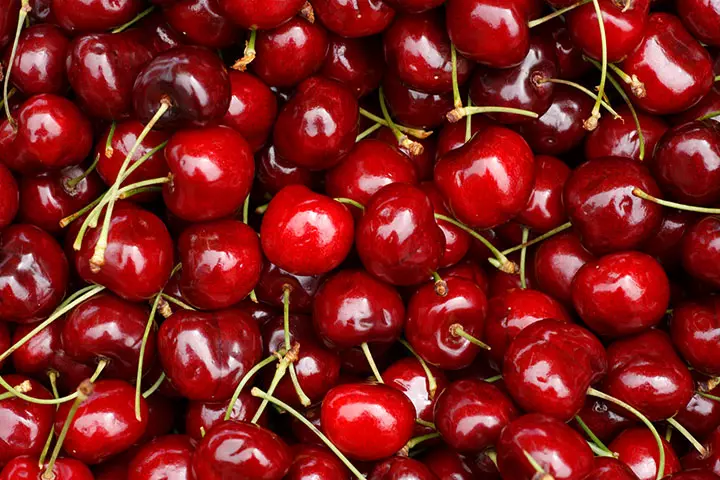
Certain sources also suggest that intake of fruits like cherries, prunes, or berries may cause gas in babies. However, scientific evidence supporting this claim is limited. It is quite common for newborns to experience gas due to their developing digestive systems.
 Quick fact
Quick factIf you notice that you or your baby may have a sensitivity or any of the above symptoms, give up on the citrus fruits, cherries, and prunes immediately before you consult a pediatrician. However, if you are breastfeeding, make sure you consume a healthy diet. Remember to listen to your body and consult with a healthcare professional if you have any concerns or questions about your breast milk production.
Fruits To Eat When Breastfeeding

Now that you know what fruits to avoid during breastfeeding, let’s understand which fruits to eat while breastfeeding.
Consuming fruits such as apples, mangoes, oranges, and bananas can help provide essential nutrients during breastfeeding (5).
Paulina Allure, a mother of two, describes how she includes mango in her healthy smoothie while breastfeeding. She explains, “I start off with a smoothie, and I add in some oat milk, which is my favorite type of milk. Of course, some almond butter, which I add to every smoothie, and some flax meal, hemp seeds, and spinach. And then lastly, add in some frozen mango, which just makes this sweet and slushie and just a really good smoothie (i).”
While there are many nutritious options available, knowing which fruits to avoid while breastfeeding helps ensure both mother and baby’s health.
Frequently Asked Questions
1. How can a breastfeeding mother determine if a fruit is affecting her milk supply?
A breastfeeding mother may be able to determine her milk supply by checking her baby’s diapers. If the baby has six or more wet diapers per day with clear or very pale pee and four or more yellow, seedy poops per day, then most likely, the baby is getting sufficient milk. If there are fewer wet diapers or darker pee, it may mean that the baby is not getting enough milk. If the mother is still unsure, she can call her doctor for further advice (6).
2. Can certain fruits interfere with the absorption of nutrients or medications while breastfeeding?
Certain fruits, including pineapple, watermelon, pawpaw, and apple, contain anti-nutrients such as saponins, alkaloids, tannins, phytates, oxalate, phenols, and HCN. However, the toxic levels of these anti-nutrients are unknown, and the levels found in these fruits are within safe limits. In addition, anti-nutrients such as phenolic compounds also have proven health benefits. Thus, consuming these fruits is encouraged as they contribute to good nutritional status and overall health (7).
3. How can I tell if my baby is having an allergic reaction to a fruit I ate while breastfeeding?
Babies can develop allergies to the food that the mother eats. If you suspect your child is allergic to the fruit you have consumed, you should look for symptoms such as diarrhea, vomiting, bloody stools, colic, poor growth, eczema, and constipation (8).
4. Is it safe to eat canned or processed fruits while breastfeeding?
It is safe to consume canned and dried fruits while breastfeeding, but you can prefer fresh fruit over it as canned fruit is stored in sugar syrup that can cause sufficient unhealthy weight gain (1).
Nursing mothers should eat plenty of fruits to get sufficient nutrition. However, not all fruits are suitable to consume during this time as they might adversely affect the baby. Thus, it is better to exercise caution while taking citrus fruits, cherries, and prunes. A baby’s digestive system may not tolerate these fruits well when they pass through the breast milk. Therefore, consuming these fruits may irritate the baby’s gastrointestinal tract. So, you may talk to your doctor about the temporary exclusion or avoidance of these from your diet. Also, you may speak to them about consuming other fruits like mango and papaya to compensate for the nutrition.
Infographic: Healthy Fruits To Include In A Lactating Mother’s Diet
Fruits are a healthy source of nutrients and minerals required by breastfeeding mothers. However, it is essential to know what fruits to include in your nursing diet to ensure no allergic reactions in you or your baby. The infographic below lists fruits that can be safely consumed during breastfeeding. Illustration: Momjunction Design Team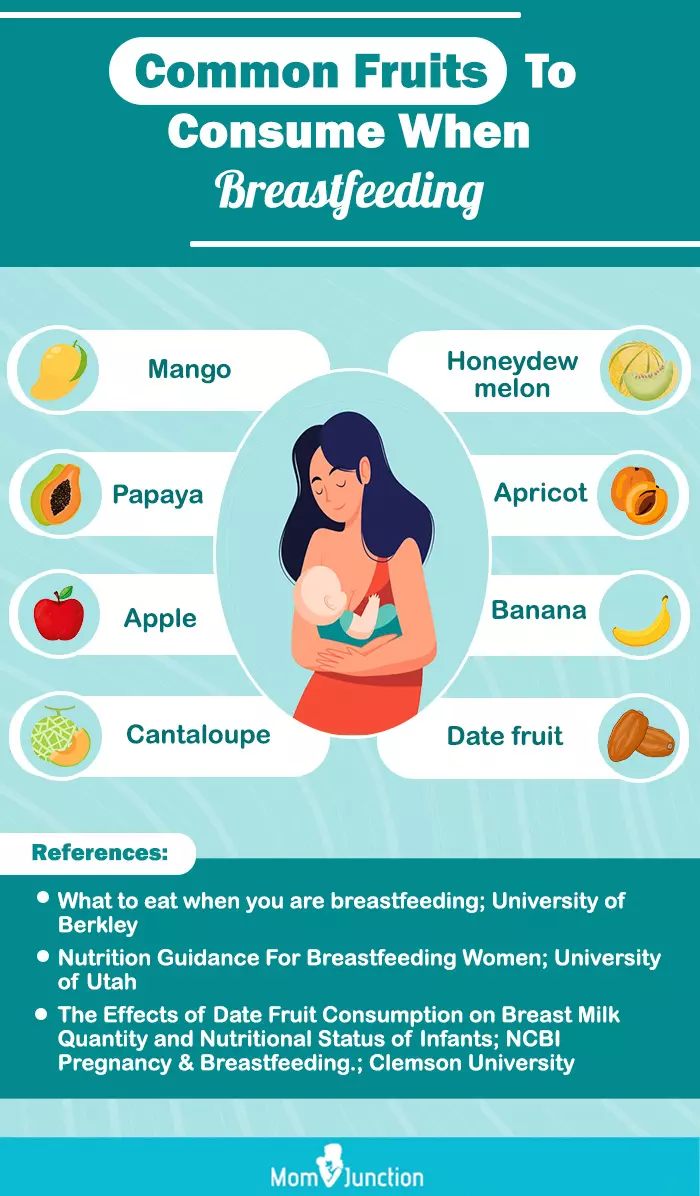
Illustration: Common Fruits To Avoid While Breastfeeding
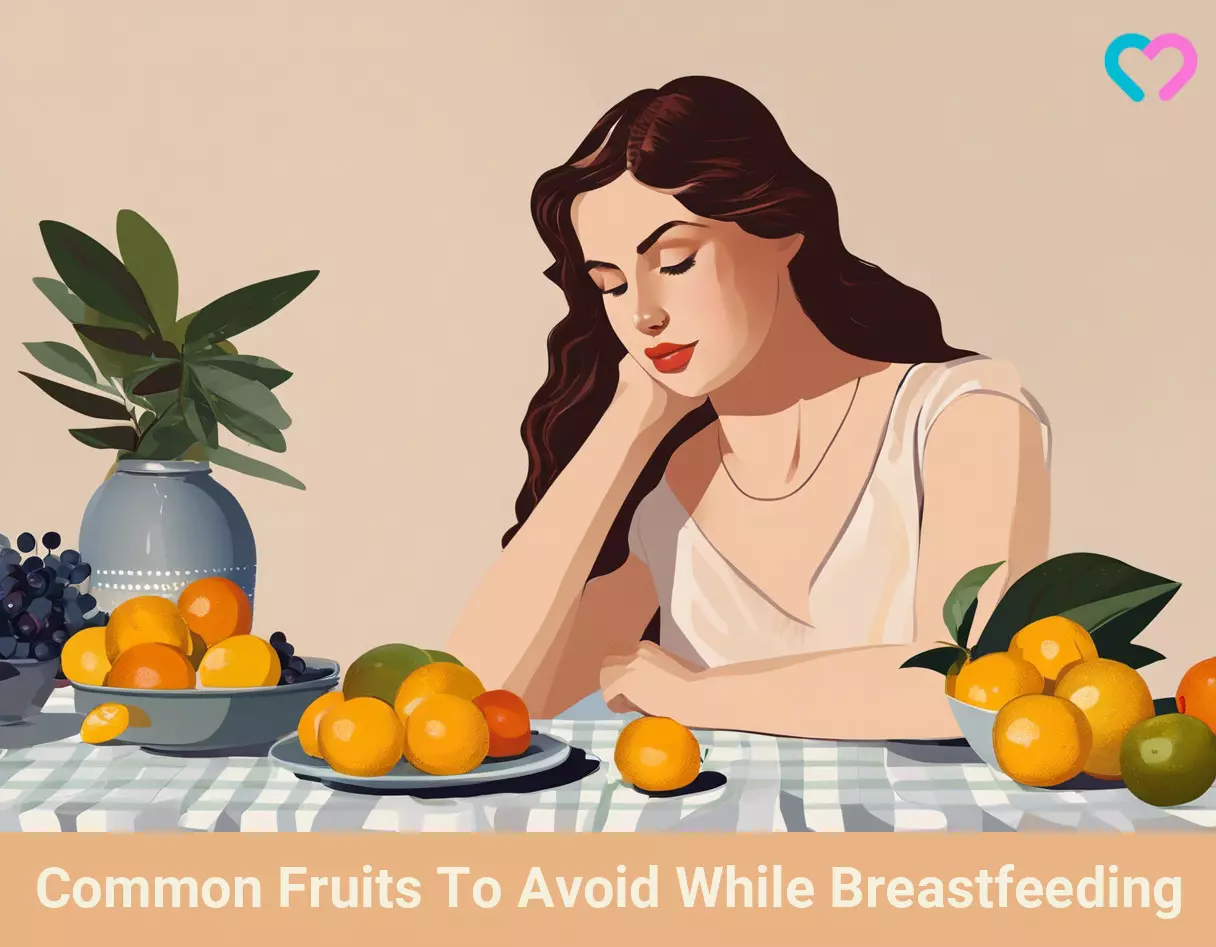
Image: Stable Diffusion/MomJunction Design Team
Personal Experience: Source
MomJunction articles include first-hand experiences to provide you with better insights through real-life narratives. Here are the sources of personal accounts referenced in this article.
i. What I eat in a day breastfeeding |increases my milk production!.https://www.youtube.com/watch?v=9JibTzp5jd0&feature=youtu.be
References:
- Breastfeeding and Diet.
https://www.nhs.uk/conditions/baby/breastfeeding-and-bottle-feeding/breastfeeding-and-lifestyle/diet/ - Karcz, Karolina, et al.; (2020); Foods to Avoid While Breastfeeding? Experiences and Opinions of Polish Mothers and Healthcare Providers.
https://pmc.ncbi.nlm.nih.gov/articles/PMC7352950/ - Spahn, Joanne M et al.; (2019); Influence of maternal diet on flavor transfer to amniotic fluid and breast milk and children’s responses: a systematic review.
https://pubmed.ncbi.nlm.nih.gov/30982867/ - Are Food Allergies Causing Your Baby’s Diaper Rash?
https://health.clevelandclinic.org/are-food-allergies-causing-your-babys-diaper-rash - Eat Healthy While Breastfeeding: Quick Tips.
https://odphp.health.gov/myhealthfinder/pregnancy/nutrition-and-physical-activity/eat-healthy-while-breastfeeding-quick-tips - Breastfeeding FAQs: Supply and Demand (for Parents).
https://kidshealth.org/en/parents/breastfeed-supply.html - Phytochemical and anti-nutritional studies on some commonly consumed fruits in lokoja, kogi state of Nigeria.
https://www.oatext.com/phytochemical-and-anti-nutritional-studies-on-some-commonly-consumed-fruits-in-lokoja-kogi-state-of-nigeria.php - Breastfeeding a Baby With Food Allergies.
https://www.chop.edu/centers-programs/breastfeeding-and-lactation-program/breastfeeding-baby-food-allergies - Prunes vs. Psyllium for Reducing Constipation.
https://badgut.org/information-centre/a-z-digestive-topics/prunes-vs-psyllium/
Community Experiences
Join the conversation and become a part of our nurturing community! Share your stories, experiences, and insights to connect with fellow parents.
Read full bio of Mindy Cockeram
- Dr. Nicole Avena is an associate professor of Neuroscience at Mount Sinai School of Medicine in New York City, and a visiting professor of Health Psychology at Princeton University. She graduated from Princeton University with a PhD in Psychology and Neuroscience, and completed her postdoctoral fellowship in molecular biology at The Rockefeller University in New York City. She is a research neuroscientist and expert in the fields of nutrition, diet and addiction, with a special focus on nutrition during the lifespan.
 Dr. Nicole Avena is an associate professor of Neuroscience at Mount Sinai School of Medicine in New York City, and a visiting professor of Health Psychology at Princeton University. She graduated from Princeton University with a PhD in Psychology and Neuroscience, and completed her postdoctoral fellowship in molecular biology at The Rockefeller University in New York City. She is a research neuroscientist and expert in the fields of nutrition, diet and addiction, with a special focus on nutrition during the lifespan.
Dr. Nicole Avena is an associate professor of Neuroscience at Mount Sinai School of Medicine in New York City, and a visiting professor of Health Psychology at Princeton University. She graduated from Princeton University with a PhD in Psychology and Neuroscience, and completed her postdoctoral fellowship in molecular biology at The Rockefeller University in New York City. She is a research neuroscientist and expert in the fields of nutrition, diet and addiction, with a special focus on nutrition during the lifespan. - Laura Howells is an IBCLC with over four years of experience. She has been working with families bringing new babies into their lives for 20 years now. Laura offers online classes, virtual one-on-one sessions as well as in-person appointments in her office in Albany, California.
 Laura Howells is an IBCLC with over four years of experience. She has been working with families bringing new babies into their lives for 20 years now. Laura offers online classes, virtual one-on-one sessions as well as in-person appointments in her office in Albany, California.
Laura Howells is an IBCLC with over four years of experience. She has been working with families bringing new babies into their lives for 20 years now. Laura offers online classes, virtual one-on-one sessions as well as in-person appointments in her office in Albany, California.
Read full bio of Jessica Albert
Read full bio of Rohit Garoo
Read full bio of Shinta Liz Sunny














